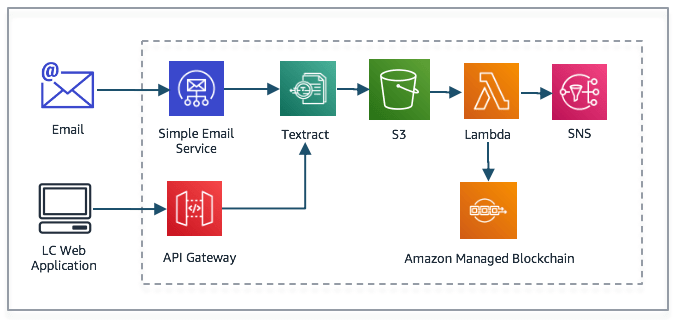
- Introduction to AWS Blockchain
- AWS Blockchain Services Overview
- Setting Up Blockchain on AWS
- AWS Managed Blockchain
- Blockchain Use Cases in AWS
- Security and Compliance in AWS Blockchain
- Challenges and Considerations in AWS Blockchain
- Best Practices for Using Blockchain on AWS
- Future Trends in AWS Blockchain
- Conclusion
Introduction to AWS Blockchain
AWS Blockchain is a suite of managed services and tools offered by Amazon Web Services (AWS) that allows businesses to easily set up, manage, and scale blockchain networks. Blockchain is a distributed ledger technology that enables secure, transparent, and immutable transactions. AWS Blockchain services aim to simplify the deployment and management of blockchain applications while leveraging the scalability, security, and performance of AWS cloud infrastructure. Enrolling in Amazon Web Service Training can help you better understand how to leverage these services effectively. AWS provides several services to enable different blockchain use cases, from public networks to private enterprise solutions and supports popular blockchain frameworks like Ethereum, Hyperledger Fabric, and Corda. These services are designed to reduce the complexity of blockchain management by automating tasks like setup, maintenance, and scaling.
Are You Interested in Learning More About AWS? Sign Up For Our AWS Course Today!
AWS Blockchain Services Overview
AWS offers several blockchain-related services that cater to different business needs. The main AWS Blockchain services include:
- Amazon Managed Blockchain: Amazon Managed Blockchain is a fully managed service that simplifies setting up and managing scalable blockchain networks. It supports Hyperledger Fabric and Ethereum, enabling developers to build and manage decentralized applications (dApps) and blockchain networks without the complexity of setting up the underlying infrastructure.
- Amazon Quantum Ledger Database (QLDB): While not a traditional blockchain service, Amazon QLDB is a fully managed ledger database designed to provide an immutable, transparent, and cryptographically verifiable transaction log, addressing some of the challenges businesses face in terms of data integrity. However, it’s important to consider What are the Issues in cloud computing such as security, compliance, and scalability, when integrating such technologies. It’s suitable for applications that require a centralized ledger with features similar to blockchain.
- AWS Blockchain Templates: AWS provides Blockchain Templates to simplify the setup of blockchain frameworks such as Ethereum and Hyperledger Fabric. These templates provide pre-configured blockchain networks, enabling quick deployments with minimal setup time.
- Amazon Web Services Marketplace for Blockchain: AWS Marketplace provides a selection of pre-built blockchain solutions and applications, allowing businesses to leverage ready-made tools to build decentralized applications.
- AWS Partner Network (APN): AWS has an extensive ecosystem of partners that provide specialized blockchain solutions, tools, and consulting services, enabling businesses to integrate blockchain into their existing infrastructure.
- Create a network: Choose the blockchain framework (Hyperledger Fabric or Ethereum), configure the network settings, and create a network.
- Add members: Invite organizations (partners) to join your network.
- Set up nodes: Deploy nodes to the blockchain network. These nodes will participate in consensus and validation.
- Smart Contracts: Deploy smart contracts to automate transactions within the network.
- API Integration: Use APIs to interact with the blockchain network and integrate it with your existing systems or applications.
- Hyperledger Fabric: An open-source, permissioned blockchain framework ideal for enterprise solutions that require privacy and high throughput.
- Ethereum: A popular public blockchain framework for building decentralized applications with a focus on transparency and decentralization. Scalability:
- Identity and Access Management (IAM): AWS uses IAM to control access to blockchain resources. You can define who has permission to interact with the blockchain network and set fine-grained access controls for each user or organization.
- Compliance: AWS Blockchain services comply with various global regulatory standards such as GDPR, HIPAA, SOC 2, and others, ensuring data security and compliance. This is crucial when considering What is Cloud Computing Architecture, as it emphasizes the importance of secure and compliant infrastructure in cloud-based solutions. Businesses can confidently use these services while maintaining regulatory compliance in their industry.
- Network Isolation: Blockchain networks can be configured to operate in private, isolated environments, ensuring that sensitive transactions are not exposed to the public.
- Audit Trails: Blockchain’s inherent immutability ensures that all transactions are recorded transparently, making it easier to track activity and maintain an audit trail.
- Select the appropriate blockchain framework based on your use case. Hyperledger Fabric is often used for private, permissioned networks, while Ethereum is more suitable for public, decentralized applications.
- Ensure that your blockchain network is designed to scale. AWS Managed Blockchain allows you to easily add or remove nodes, but you should plan for scalability from the start to handle growing transaction volumes.
- Take advantage of AWS services that complement your blockchain solution. For example, AWS Lambda for serverless computing, Amazon S3 for storing blockchain data, and Amazon CloudWatch for monitoring, alongside Top Cloud Databases, which can further optimize data management and performance in your blockchain ecosystem.
- Follow AWS security best practices, such as using IAM roles and policies for access control, enabling encryption for data at rest and in transit, and ensuring that private keys are securely managed.
- Before deploying your blockchain solution into production, thoroughly test your network and smart contracts to ensure they perform as expected and are free of vulnerabilities.
- Use AWS CloudWatch to monitor blockchain network performance, and regularly optimize the network and nodes to ensure high availability and low latency.
Setting Up Blockchain on AWS
Setting up blockchain networks on AWS involves using the right tools and services based on the chosen blockchain framework and the specific use case. Below is an overview of how you would typically set up a blockchain network on AWS.
Select the Blockchain Framework:
Choose between Hyperledger Fabric, Ethereum, or other supported frameworks. Your choice depends on whether you need a private, permissioned network (Hyperledger) or a public, permission less network (Ethereum).
Use Amazon Managed Blockchain:
For a simple setup, use Amazon Managed Blockchain. The service allows you to quickly create and manage blockchain networks, offering a seamless solution for blockchain integration. Additionally, businesses can complement this with Fundamental Microsoft Cloud Services That Are In Demand to enhance their cloud infrastructure and service offerings. Here’s the general process:

Configure and Customize the Blockchain:
Monitor and Scale:
AWS provides monitoring and scaling tools like Amazon CloudWatch to track the performance and health of your blockchain network. You can also scale the network as needed by adding more nodes or adjusting configurations.
Want to Obtain Your AWS Certificate? View The AWS Course Offered By ACTE Right Now!
AWS Managed Blockchain
Amazon Managed Blockchain is the centerpiece of AWS’s blockchain offerings. It simplifies the setup, management, and scaling of blockchain networks, allowing businesses to focus on their blockchain applications rather than the underlying infrastructure.
Key features of AWS Managed Blockchain:
Support for Multiple Frameworks:AWS Managed Blockchain enables users to easily scale their blockchain network by adding new nodes to the network or increasing the performance of existing nodes, providing flexibility and efficiency. This aligns with insights from Cloud Computing An Analysis Of Cisco’s Cloud Index Survey, which highlights the growing importance of scalable cloud solutions in modern business environments.
Simplified Management:AWS handles the heavy lifting of managing and maintaining the underlying infrastructure, including patching, upgrading, and ensuring high availability.
Cost Efficiency:Managed Blockchain charges based on the number of nodes and the compute resources used, providing flexibility in terms of scaling the network according to business needs.
Integration with AWS Services:AWS Managed Blockchain integrates seamlessly with other AWS services, such as Amazon S3 for storage, Amazon CloudWatch for monitoring, and AWS Lambda for automating processes in response to blockchain events.
Blockchain Use Cases in AWS
AWS Blockchain services enable several key use cases across various industries. Some notable use cases include: Blockchain’s ability to provide transparent, immutable records is useful for tracking goods through supply chains. Companies can use AWS Blockchain to trace the origin, journey, and certification of products, enhancing trust and transparency. Financial institutions can use blockchain to improve transaction security, and speed, and reduce costs associated with traditional banking systems. Blockchain can also facilitate cross-border payments, real-time settlement, and secure digital asset exchanges, especially when combined with AWS Training to enhance cloud infrastructure and optimize blockchain solutions. AWS Blockchain can be used to maintain secure and immutable records of patient data, providing a transparent way to track medical histories, prescriptions, and treatment plans. It ensures compliance with healthcare regulations and improves data sharing among providers. Blockchain’s decentralized nature allows for secure and verifiable digital identities. Organizations can use AWS Blockchain to create and manage digital IDs that are resistant to tampering and fraud. Blockchain-based voting systems can enhance transparency and prevent fraud. Governments or organizations can build secure, transparent voting mechanisms using AWS Blockchain to track and verify votes. AWS Blockchain services enable developers to build, deploy, and manage dApps using frameworks like Ethereum. These applications can operate in a decentralized manner, ensuring transparency and reducing the risk of censorship.
Are You Considering Pursuing a AWS Master’s Degree? Enroll For AWS Masters Course Today!
Security and Compliance in AWS Blockchain
Security and compliance are critical when implementing blockchain solutions, especially for sensitive data. AWS Blockchain services incorporate several security measures to protect blockchain data:
Challenges and Considerations in AWS Blockchain
While AWS Blockchain provides numerous benefits, businesses must consider potential challenges to ensure successful deployment. One of the primary challenges is choosing the right blockchain framework, as different frameworks have varying levels of decentralization, security, and scalability. Additionally, enterprises must address the complexities of integrating blockchain with legacy systems, which may require custom API development and middleware solutions.

Another key consideration is cost management, as blockchain networks can become expensive when scaling nodes and utilizing high-performance computing resources. Security remains a crucial factor, requiring strict access control mechanisms, encryption strategies, and adherence to compliance regulations. Finally, performance bottlenecks, such as transaction throughput limitations and network latency, must be monitored and optimized using AWS performance tools.
Best Practices for Using Blockchain on AWS
To maximize the benefits of AWS Blockchain and ensure success, here are some best practices to follow:
Choose the Right Blockchain Framework:
Design for Scalability:
Leverage AWS Integrations:
Implement Security Controls:
Test Thoroughly:
Monitor and Optimize Performance:
Go Through These AWS Interview Questions & Answer to Excel in Your Upcoming Interview.
Future Trends in AWS Blockchain
As blockchain technology evolves, AWS is likely to integrate more advanced features, including AI and machine learning for deeper insights, and enhanced interoperability between different blockchain networks. Automation tools will continue to simplify blockchain management, while edge computing may enable faster transaction processing in remote areas. Privacy enhancements, such as zero-knowledge proofs, could improve data security, and AWS Training may introduce tools to help businesses comply with complex regulations while leveraging the full potential of AWS cloud services. These trends highlight AWS’s ongoing efforts to provide scalable, secure, and innovative blockchain solutions for various industries.
Conclusion
AWS Blockchain offers a comprehensive suite of tools and services that simplify the development, deployment and management of blockchain applications. Whether businesses require a fully managed blockchain network or a centralized ledger with blockchain-like properties, AWS provides scalable, secure, and efficient solutions. By leveraging AWS Managed Blockchain, Amazon QLDB, and other blockchain services, businesses can implement blockchain technology without the complexity of traditional deployments. Organizations should follow best practices, such as choosing the right framework, integrating AWS services, ensuring security compliance, and optimizing performance, to maximize the benefits of AWS Blockchain. As blockchain technology continues to evolve, AWS remains a strong platform for enterprises looking to adopt and scale blockchain solutions efficiently.





